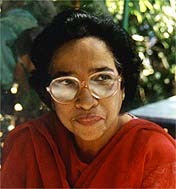In
the 1880s, a young woman from Madras raised her voice against the systemic
degradation of women. She believed that if women had to rise to power, they
should redefine feminity. Marriage and domesticity should not be the sole
ambition of women. They had the right to live and not simply exist; the right
to independent thought and intellectual pursuits. This brave woman was bold
enough to communicate her convictions through her writing. She was the first
Indian woman to write in English, and the first Indian feminist novelist.
Kripabai
was born in 1862 at Ahmednagar, to Hindu parents Haripunt and Radhika Khisty.
She lost her father at an early age and was brought up by her mother and
brother. Her brother Bhaskar encouraged her to read a lot, and engaged her in
discussions on then prevailing issues. Unfortunately he too died at a young age.
Kripabai
converted to Christianity but she grew up observing both religions. Her
education was sponsored by two European missionaries. She was the first woman
to attend the Madras Medical College. She lived as a boarder in the house of
Rev. W. T. Sattiyanandan. But because of her poor health, she had to
discontinue her medical studies.
While
boarding in the Reverend’s house, she fell in love with his son Samuel
Sattiyanandan and married him. He was the Head Master of a school in Ooty.
Kripabai used that time in Ooty to start a school for Muslim girls. She was a
strong advocate of women’s education This was also the time when she started
writing her articles and poems. They were published under the byline “An Indian
Lady.” Her first published article was “A Visit to the Todas.”
Ill
health dogged her footsteps and she had to return to the warmer climate of
Madras in 1886, when she seriously began to write her first book “Suguna –Story
of a Native’s Christian Life.” It was semi-autobiographical in which she also
referred to her brother. Though she spoke Marathi, Tamil and Telugu, she found
it easier to write in English in which she was fluent. During this time, she
gave birth to a child who died before its first year.
Kripabai’s
health gradually deteriorated. She was diagnosed with Tuberculosis which did
not respond to treatment. She used this time to write her second novel “Kamala”-
The story of a high caste Hindu woman caught in the grip of orthodoxy, and her
life as a child bride, mother and widow. Some of it was written from her
hospital bed.
Kripabai
was an advocate of women’s education. She was passionately involved in women’s
issues and decried decadent customs and superstitions. Some of her articles
were unfinished at the time of her death in 1894.
Madras
Medical College has perpetuated her memory by offering a scholarship to a woman
candidate to study Pharmacology or go for higher Medical studies. Madras
University too offers a medal to a female who stands first in English.
It
is a pity that Kripabai died so young and could not see the progress of women
in the 21st century.






